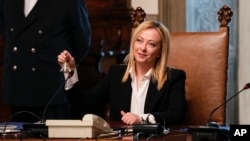Meloni said her government, the country's most far-right since World War II, wanted to "stop illegal departures and break up human trafficking," notably by preventing departures from crisis-hit Libya.
She insisted it was time to stop traffickers "being the ones who decide who gets in," while her new interior minister said he may block charity ships from bringing rescued migrants to Italy, reviving a controversial policy from 2019.
Alarm Phone, a group running a hotline for migrants needing rescue, warned earlier Tuesday that it believed two vessels carrying over 1,300 people between them had run into trouble during the crossing.
It said it had received a call for help from "a large wooden boat that left Tobruk, Libya." The boat was "now in the SAR zones of Malta and Italy", Alarm Phone said on Twitter, referring to the sea search and rescue areas for which Rome and Valletta are responsible.
In a subsequent tweet, Alarm Phone said it believed there were two boats that had departed from Libya together.
"We were told that one carries about 700, the second about 650 people. Reportedly, a person died and engines aren't working anymore," it said. "A huge rescue operation is needed!"
On Monday, Italy's coast guard had recovered the bodies of one-month old twins who died during a crossing from Tunisia, according to Italian media reports. The boy and girl had been dangerously underweight, and their parents had hoped they would be saved by Italian doctors, the reports said.
Interior Minister Matteo Piantedosi, on his third day in office, said Tuesday that two charity ships currently operating in the Mediterranean were "not in line with the spirit of European and Italian regulations" on border security and that he was deliberating whether to ban their entry into Italian waters.
In her speech to parliament, Meloni said the right to asylum for those fleeing war and persecution would be respected.
But humanitarian associations say those rights are non-existent under an EU-sponsored agreement between Italy and Libya under which the so-called Libyan coast guard intercepts migrants at sea and forcibly returns them to the strife-torn country.
Campaigners say nearly 100,000 people have been intercepted since 2017. Most are believed to have ended up in Libyan detention centers, which have been compared by Pope Francis to concentration camps.
Italy's new government has until next week to decide whether or not to scrap the deal or allow it to automatically renew for another three years.
Italy has long been on the migration frontline, taking in tens of thousands of people who attempt the world's deadliest crossing yearly.






